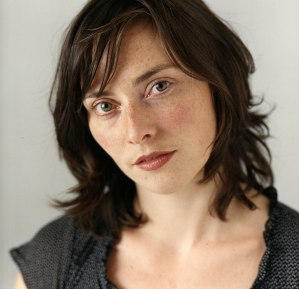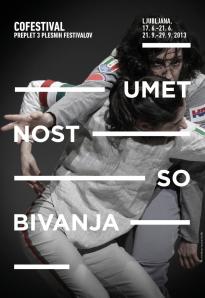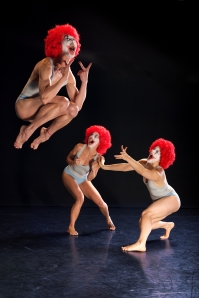Could you talk a little bit about the work you have developed as part of modul-dance? My modul-dance piece, Body and Forgetting, premiered on January 29th 2013 at The Abbey Theatre on The Peacock stage in Dublin. Through the structure of modul-dance and other partners such as the Dublin Dance Festival, The Abbey Theatre and Dance Ireland, I was able to lengthen my creative process and develop the piece in stages over a 14 month period. Through modul-dance specifically I had a residency with my dancers and musician at DeVIR/CAPa Faro in Portugal and also at Dance Ireland Dublin.
 The work was influenced by Milan Kundera's atmospheric and unsettling novel The Book of Laughter and Forgetting and presented an abstracted account of the themes, moods and characters from the book in movement with the constant accompaniment of a film and live score. I collaborated with Irish documentary and film maker Alan Gilsenan.
The work was influenced by Milan Kundera's atmospheric and unsettling novel The Book of Laughter and Forgetting and presented an abstracted account of the themes, moods and characters from the book in movement with the constant accompaniment of a film and live score. I collaborated with Irish documentary and film maker Alan Gilsenan.
What connections have you been able to establish through modul-dance? In general modul-dance has helped me to become more familiar with the current prevailing European production trends, put faces to names within a European context and make new relationships that have afforded me useful feedback.
What were your expectations when you joined modul-dance and what is your experience insofar? When I joined modul-dance I was mostly interested in making new connections with European dancers, designers and collaborators. To be honest, this has yet to materialize but it may be more to do with my approach as opposed to the modul-dance structure. I originally assumed that meetings would occur organically through residency or performance opportunities but now after some time in the network I am beginning to understand it better and see that my initial expectations may have been too vague.
How do you think modul-dance has helped you and your new project and/or how would you like it to help you further? I think modul-dance has helped my project through residency opportunities, advice, feedback and time. In the future I would of course appreciate opportunities to further the life of Body and Forgetting through further performance opportunities in Europe, but also as I begin to make a new solo work this year I look forward to seeking dramaturgical advice from the modul-dance framework of supports. In the long-term I would hope to achieve my initial expectations and emerge from this modul-dance experience having gained new insight into my working process and making better work with inspiring artists from my field and associated fields of expression.
Do you think European mobility projects like modul-dance influence the way the work is created and, if so, how? Yes, I do think that European mobility projects influence the way the work is created. I'm not sure that it is always the ideal structure in which to make work. It depends on the subject matter you are exploring. Body and Forgetting, although inspired by a Czech writer, was very much to do with an Irish perspective and relationship to the body. The embodied reserve, loss and confusion of that perspective can only really be reflected on from a point of stillness. I realized early on in my process that my subject matter conflicted in someways with the sense of mobility in the modul-dance project but that was the way it turned out and I'm sure it created some interesting tensions in the process.
If it's true that the way in which people sit, swim or eat depend on how certain culture passes on these skills - as French sociologist Marcel Mauss stated - then our body (and dance?) is influenced and formed in a culturally specific way. Do you feel that this is true or is it true what John Ashford provocatively says that "borders in dance are dissolving and increasingly what we find on the other side is pretty much more of the same"? This quote by Tom Waits came to mind as a rather extreme response to the question above, “If two people know the same things, one of you is unnecessary”. I wondered if this is what the question is really asking? In some ways I believe personal culture to be embedded and inescapable though more and more we find ourselves living out similar situations; maybe it is just economics and not culture.
I am not sure that this issue should be so important for artists but I think it could become more of a problem for presenters and producers. However it progresses, the importance must remain with the artist at the centre of their own experience, whatever that may be.
As an Irish artist, where would you position yourself within the European dance context? Although I have done many residencies and had my work performed in Europe during the last 10 years, I have a relatively low profile as a choreographer there. Throughout this time I have been building my own company with a group of dancers and creative collaborators in Ireland. It was important to develop this relationship to my work steadily and over time. Having been through this period I now look to the possibilities for interaction, dialogue and connection in Europe and hope in the next 5 years I can grow opportunities for my work, embrace new influences and expand artistically.
Picture: © Fionn McCann




